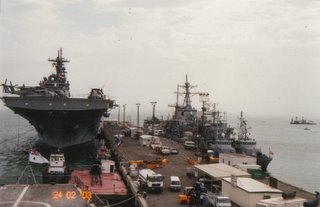Bombs Away

As Digby notes, Senator Warner was just on CNN saying that the UAE deal was all about maintaining our military access there.
From Richard Clarke's Against All Enemies, p. 111:
In May 1996, shortly before the Atlanta Olympics, word reached Washington of a remarkable discovery made by the Belgian authorities. They had intercepted a shipment en route to Germany. Inside what was labeled as "pickles" was a custom-designed weapon best described as the largest mortar ever seen. The weapon was designed to lob a large explosive charge a short distance, such as over the walls of an Israeli or US embassy compound. The shipment was traced to Iran.This is, after all, the administration that reluctantly rushed through a National Intelligence Estimate (NIE) on Iraq in only 20 days with no outside peer review that might have spotted all the bogus WMD claims. Why would they wait around for some pesky, arbitrary legally mandated 45 day investigation into the Dubai World Ports transfer?
The Defense Department agreed to our request to station an additional aircraft carrier battle group in the waters off Iran temporarily, as a deterrent signal to Tehran. The Navy was growing increasingly concerned with anti-ship missiles that Iran was placing on islands in the Persian Gulf and on its coastline, particularly at the narrow point in the Gulf leading to the Indian Ocean, the Straits of Hormuz. In early May, DOD announced that Iran had acquired long-range missiles from North Korea and was engaged in a program to protect its missiles in hardened bunkers.
The Navy relied on two ports in the Persian Gulf. Only one, in the United Arab Emirates, could handle an aircraft carrier. That port, near Dubai, saw more U.S. Navy ships anchored and more U.S. sailors ashore than any harbor outside the United States during the 1990s. It remained, however, a commercial facililty with no permanent U.S. Navy facility. The U.S. Navy base was a few hundred kilometers up the Gulf in the island nation of Bahrain. There, thousands of U.S. sailors lived and worked. After the Tanker War and then the first Gulf War, the little Navy base at Bahrain had mushroomed into a large and active facility. In 1996, DOD announced that the base would now be headquarters to a new entity, the Fifth Fleet. With the Soviet navy rusting at Siberian ports and the Iraqi Navy sitting on the bottom of the Persian Gulf and Shatt al-Arab, the Fifth Fleet had only one possible enemy: Iran.


<< Home